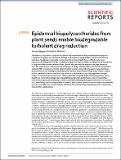Epidermal biopolysaccharides from plant seeds enable biodegradable turbulent drag reduction
Author(s)
Rajappan, Anoop; McKinley, Gareth H
Downloads41598-019-54521-3.pdf (1.767Mb)
Terms of use
Metadata
Show full item recordAbstract
The high cost of synthetic polymers has been a key impediment limiting the widespread adoption of polymer drag reduction techniques in large-scale engineering applications, such as marine drag reduction. To address consumable cost constraints, we investigate the use of high molar mass biopolysaccharides, present in the mucilaginous epidermis of plant seeds, as inexpensive drag reducers in large Reynolds number turbulent flows. Specifically, we study the aqueous mucilage extracted from flax seeds (Linum usitatissimum) and compare its drag reduction efficacy to that of poly(ethylene oxide) or PEO, a common synthetic polymer widely used as a drag reducing agent in aqueous flows. Macromolecular and rheological characterisation confirm the presence of high molar mass (U+2265 2 MDa) polysaccharides in the extracted mucilage, with an acidic fraction comprising negatively charged chains. Frictional drag measurements, performed inside a bespoke Taylor-Couette apparatus, show that the as-extracted mucilage has comparable drag reduction performance under turbulent flow conditions as aqueous PEO solutions, while concurrently offering advantages in terms of raw material cost, availability, and bio-compatibility. Our results indicate that plant-sourced mucilage can potentially serve as a cost-effective and eco-friendly substitute for synthetic drag reducing polymers in large scale turbulent flow applications. Keywords: fluid dynamics; mechanical engineering; polymers; rheology
Date issued
2019-12Department
Massachusetts Institute of Technology. Department of Mechanical EngineeringJournal
Scientific Reports
Publisher
Springer Science and Business Media LLC
Citation
Rajappan, Anoop, and Gareth H. McKinley. "Epidermal biopolysaccharides from plant seeds enable biodegradable turbulent drag reduction." Scientific Reports 9, 1 (December 2019): 18263 © The Author(s) 2019
Version: Final published version
ISSN
2045-2322